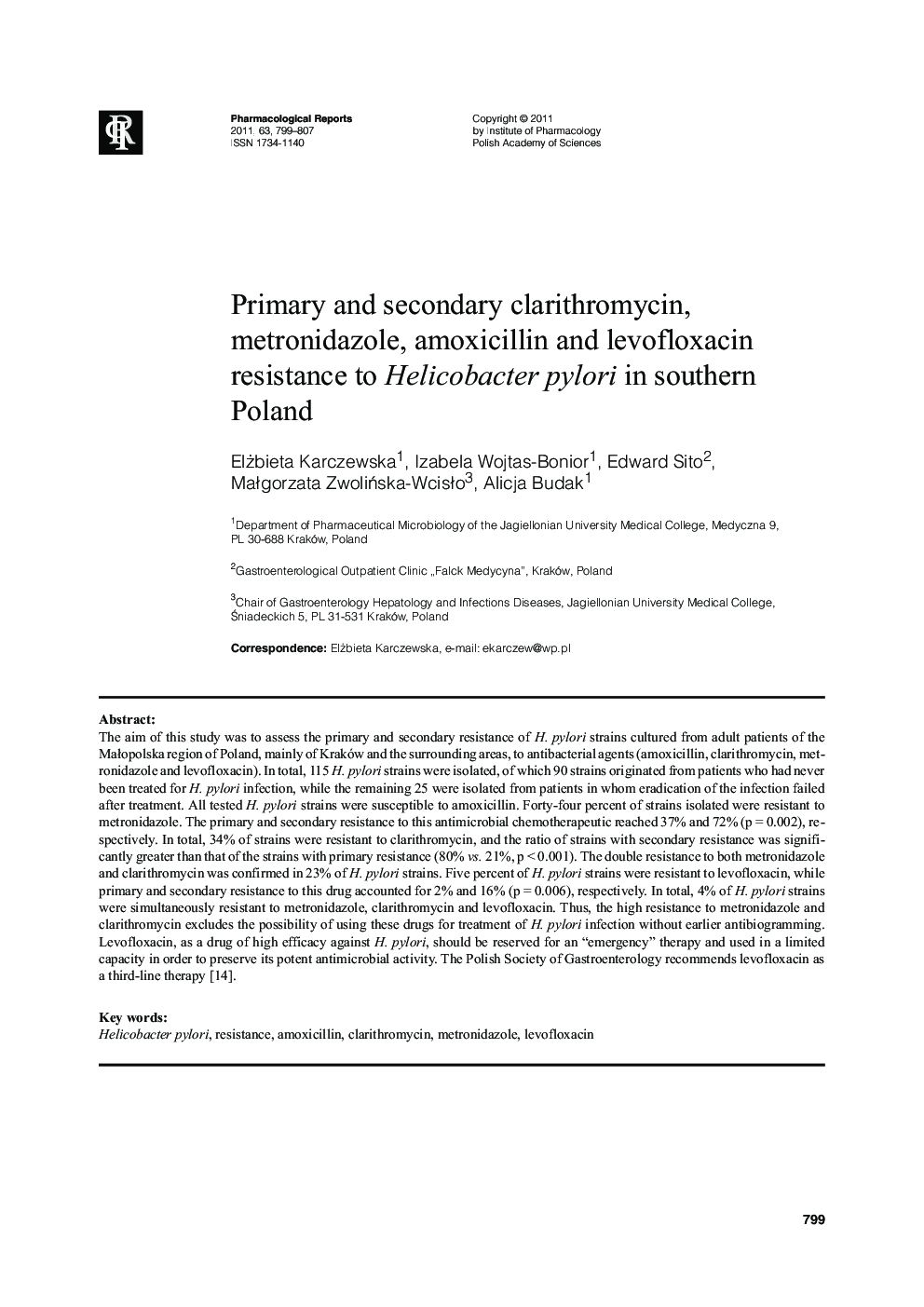| کد مقاله | کد نشریه | سال انتشار | مقاله انگلیسی | نسخه تمام متن |
|---|---|---|---|---|
| 2012070 | 1067023 | 2011 | 9 صفحه PDF | دانلود رایگان |
عنوان انگلیسی مقاله ISI
Primary and secondary clarithromycin, metronidazole, amoxicillin and levofloxacin resistance to Helicobacter pylori in southern Poland
دانلود مقاله + سفارش ترجمه
دانلود مقاله ISI انگلیسی
رایگان برای ایرانیان
کلمات کلیدی
موضوعات مرتبط
علوم زیستی و بیوفناوری
بیوشیمی، ژنتیک و زیست شناسی مولکولی
زیست شیمی
پیش نمایش صفحه اول مقاله

چکیده انگلیسی
The aim of this study was to assess the primary and secondary resistance of H. pylori strains cultured from adult patients of the MaÅopolska region of Poland, mainly of Kraków and the surrounding areas, to antibacterial agents (amoxicillin, clarithromycin, metronidazole and levofloxacin). In total, 115 H. pylori strains were isolated, of which 90 strains originated from patients who had never been treated for H. pylori infection, while the remaining 25 were isolated from patients in whom eradication of the infection failed after treatment. All tested H. pylori strains were susceptible to amoxicillin. Forty-four percent of strains isolated were resistant to metronidazole. The primary and secondary resistance to this antimicrobial chemotherapeutic reached 37% and 72% (p = 0.002), respectively. In total, 34% of strains were resistant to clarithromycin, and the ratio of strains with secondary resistance was significantly greater than that of the strains with primary resistance (80% vs. 21%, p < 0.001). The double resistance to both metronidazole and clarithromycin was confirmed in 23% of H. pylori strains. Five percent of H. pylori strains were resistant to levofloxacin, while primary and secondary resistance to this drug accounted for 2% and 16% (p = 0.006), respectively. In total, 4% of H. pylori strains were simultaneously resistant to metronidazole, clarithromycin and levofloxacin. Thus, the high resistance to metronidazole and clarithromycin excludes the possibility of using these drugs for treatment of H. pylori infection without earlier antibiogramming. Levofloxacin, as a drug of high efficacy against H. pylori, should be reserved for an “emergency” therapy and used in a limited capacity in order to preserve its potent antimicrobial activity. The Polish Society of Gastroenterology recommends levofloxacin as a third-line therapy [14].
ناشر
Database: Elsevier - ScienceDirect (ساینس دایرکت)
Journal: Pharmacological Reports - Volume 63, Issue 3, MayâJune 2011, Pages 799-807
Journal: Pharmacological Reports - Volume 63, Issue 3, MayâJune 2011, Pages 799-807
نویسندگان
Elżbieta Karczewska, Izabela Wojtas-Bonior, Edward Sito, MaÅgorzata ZwoliÅska-WcisÅo, Alicja Budak,